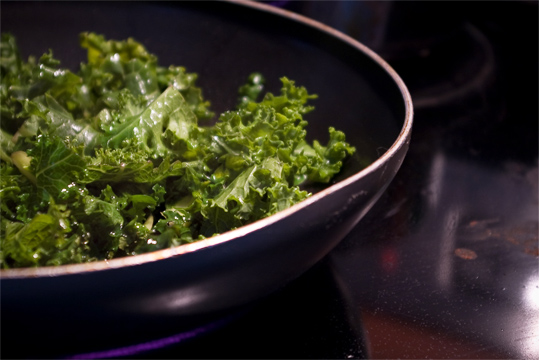
Reducing Food Waste in Foodservice
October 16, 2018 by Doreen Garelick, Dietetic Intern
Our intern Doreen attended a food waste summit for restaurants and compiled these tips to help food service operators redirect…
Nutrition 101
June 20, 2013

Photo credit: greg.turner
Healthline.com writer David Novak guest blogs on the benefits of folate and how to maximize your intake.
Folate, a B-vitamin found naturally in many foods, helps your body make new cells and keeps your blood healthy. It also reduces the likelihood of getting anemia, which can be very detrimental to your health. Anemia, means you have fewer healthy red blood cells than normal. This makes it hard for your blood to carry enough oxygen throughout your body. Eating plenty of folate-rich foods eliminates this detriment.
Folate, also known as “B9”, can also help prevent many types of birth defects. Eating plenty of foods containing folate before and during pregnancy can help prevent certain defects of the baby’s spine and brain, mainly “spina bifida”, a congenital defect of the spine in which part of the spinal cord and its meninges are exposed through a gap in the backbone . Pregnant women need folate before and during the first weeks of pregnancy for this reason.
If you're actively trying to conceive a child, most pregnancy experts believe supplementation of at least 400 mcg of folate a day is the best approach for women planning pregnancy. Your body doesn't absorb folate as easily as it absorbs synthetic folate, and most people don't get the recommended amount of folate through diet alone, so vitamin supplements are necessary to prevent such things as spina bifida. And, it's possible that folate will also help reduce the risk of other birth defects, including cleft lip, cleft palate and some congenital heart defects.
If that's not enough, folate has been shown to prevent other diseases including various forms of cancer, premature hearing loss, depression and even Alzheimer's disease. Folate can be taken in vitamin pills, but is best absorbed if eaten in the foods that contain the vitamin.
If you were born with spina bifida, are susceptible to seizures or are diabetic, you may benefit from increased doses of folate. In these cases, the recommended dose of folic acid may be up to 4,000 mcg (4 mg). It's a good idea to check with your doctor before taking additional folic acid supplements.
Several foods, including rice, pasta, bread and breakfast cereals are fortified with 400 mcg of folic acid per serving. Folate may be listed on food packages as folic acid, which is the synthetic form of folate. Other foods rich in folate include beans, egg yolks, soy milk, dark green vegetables (like spinach, kale, collards and broccoli) and citrus fruits and juices.
Although many other foods may have folate in them, it's a guessing game as to how well folate in various foods absorb in your body. Poor digestion and reduced absorption greatly contribute to various health problems. Only the absorbed folate is distributed throughout the body, so sticking with the above mentioned foods is perhaps the best way to maximize the benefits of folate.
Folate, or folic acid, is necessary for the healthy development of our cells, a healthy brain and protection from cell damage that may lead to future cancers and other abnormalities. Folic acid also aids drugs used to treat depression and may even hold great promise for the growing autism epidemic that faces the world today. While the country may be somewhat deficient in this incredible vitamin, being conscious of the foods that are rich in folate can only improve your over-all health, as well as your baby's health, in the case of pregnant women.
David Novak is a international syndicated newspaper columnist, appearing in newspapers, magazines, radio and TV around the world. His byline has appeared in GQ, National Geographic, Newsweek, The Wall Street Journal, Reader's Digest, USA Today, among others, and he has appeared on The Today Show, the CBS Morning Show and Paul Harvey Radio. David is a specialist at consumer technology, health and fitness, and he also owns a PR firm and a consulting company where he and his staff focus on these industries. He is a regular contributing editor for Healthline.com. For more information, visit here.

October 16, 2018 by Doreen Garelick, Dietetic Intern
Our intern Doreen attended a food waste summit for restaurants and compiled these tips to help food service operators redirect food waste from landfills.
Nutrition 101

Nutrition 101
September 26, 2018 by Doreen Garelick, Dietetic Intern
Ever notice headlines about rapid weightloss? Dietetic Intern Doreen Garelick looks deeper into a recent eye-catching headline to see if there's any truth behind it.
Connect
 Follow us on Twitter
Follow us on Twitter Friend us on Facebook
Friend us on Facebook Follow us on Pinterest
Follow us on Pinterest Follow us on Instagram
Follow us on Instagram Read our Blog
Read our Blog Watch videos on YouTube
Watch videos on YouTube Watch videos on Vimeo
Watch videos on Vimeo Connect with us on Linkedin
Connect with us on Linkedin Find us on Foursquare
Find us on Foursquare
Tweets by @SPEcertifiedBlog Search
Categories
SPE Certified Newsletter
Sign up for news on the latest SPE-certified venues, events and SPE updates.
We will never share your personal information with a third party.